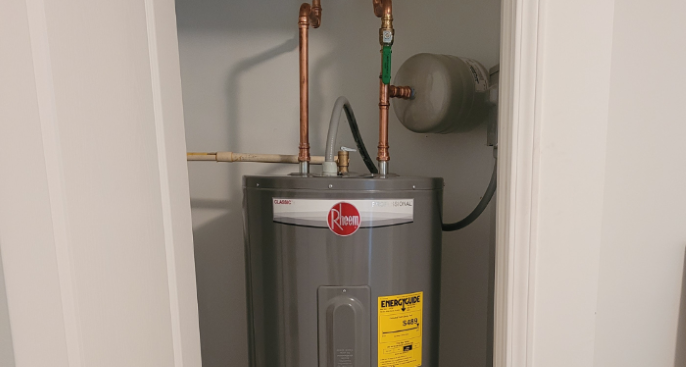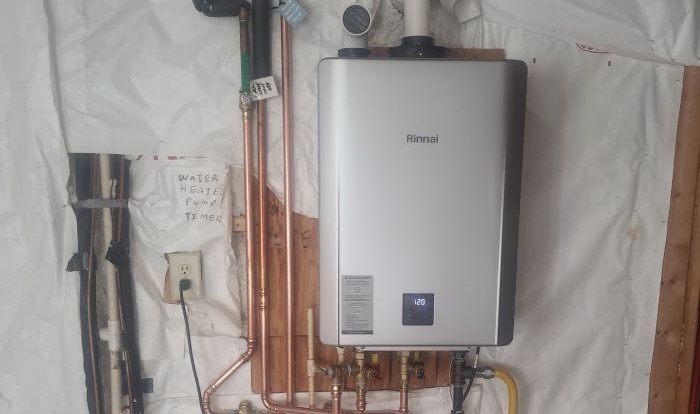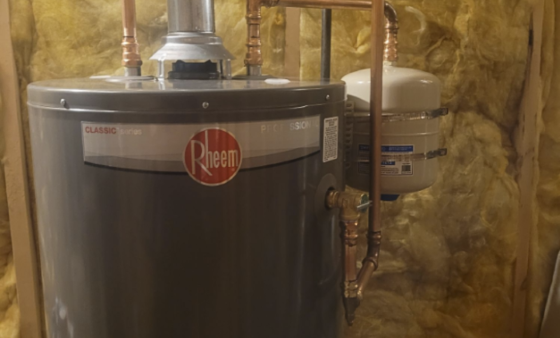
What Type of Water Heater is Best for Your Family?
When deciding between a tankless water heater and a traditional water heater, most homeowners want hot water on demand, lower energy bills, and fewer repairs. Understanding the pros and cons of each option in today’s energy-conscious world helps you make a smarter investment for your home.
Which One Makes More Sense for Your Home?
Thinking about replacing your old water heater? You’re not alone. A lot of homeowners in the Marietta and Metro Atlanta area are torn between getting a tankless water heater or sticking with a traditional tank model.
The right one for you depends on how much hot water you use, your space, and your budget.
What’s the Real Difference?
When choosing a new water heater for your home it really depends on what your needs are for your family because there are benefits to both.
Tankless Water Heaters – Heat as You Go
Tankless heaters don’t store water. They heat it up only when you need it. That means no waiting for a tank to refill and no paying to keep water hot all day.
-
They’re energy efficient and can lower your power bill.
-
You get hot water on demand, which is perfect for long showers or back-to-back use.
-
They’re also small and wall-mounted, so they save space.

Traditional Water Heaters – Tried and True
Traditional water heaters store a bunch of hot water (usually 40–80 gallons) in a big tank.
-
They’re familiar, easy to use, and most plumbers know them inside and out.
-
They cost less up front to install.
-
But once you run out of hot water, you’ve got to wait for it to heat up again.

A Comparison Between Energy Efficiency and Utility Costs
The cost to install a traditional water heater cost less but in the long run tankless wins.
How Tankless Systems Save You Money
Tankless models reduce standby heat loss. You don’t pay to keep unused water hot.
- On average, homeowners save $80–$100 per year on energy bills.
Traditional Units Can Cost More Over Time
While cheaper upfront, traditional units:
-
Use more energy daily.
-
Often need earlier water heater repair or full replacement.
-
Can run out of hot water, leading to higher water usage and bills.
How Long Do They Last?
Tankless = Long Lifespan
-
Expect 20 years or more with proper maintenance.
-
Especially good in areas with soft water, or if you stay on top of flushing them yearly in hard water zones.
Traditional = Shorter Lifespan
-
Most last 10 to 15 years.
-
They’re more prone to rust and sediment buildup, which means more frequent replacements or repairs.
Installation Costs: What to Expect
Tankless = Lower Bills Over Time
Tankless heaters can be pricey to install, but they use less energy in the long run.
-
They only heat water when you turn on the tap.
-
Many last 20 years or more, which is longer than tank models.
-
On average, you can save $80–$100 a year on your energy bill.
Switching to a tankless system may involve new pipes or electrical upgrades.
-
Gas vs electric water heaters matter too—gas is often more powerful, but electric can be easier to install.
-
If you’re switching from a traditional tank, expect a bit more prep and higher labor costs.
Traditional = Cheaper Upfront, Costlier Later
Traditional systems are more affordable up front.
-
Installs usually cost $800–$1,600, while tankless can be $1,800–$3,500.
-
But they tend to need more maintenance and don’t last as long—usually around 10–15 years.
-
They’re less efficient because they constantly keep water warm.
Most homes are already set up for traditional water heaters. Installation is faster and doesn’t usually require much extra work. It’s a great choice if you’re replacing an old one and want something simple.
Performance and Hot Water Supply
Tankless Water Heaters: Endless Flow
-
Never run out of hot water — great for families, frequent laundry, and guests
-
Flow rate matters: high-demand homes may need multiple units
Traditional Water Heaters: Limited but Powerful
-
Best for simultaneous usage (showers, dishwasher, laundry)
-
Once the tank is empty, you’ll need to wait 20–60 minutes to reheat
Space and Design: Minimalist vs Bulky
Tankless Models Save Serious Space
-
Wall-mounted units free up floor space
-
Perfect for condos, townhomes, or utility closets
Traditional Units Take Room to Work
-
Require significant floor space and ventilation
-
Often installed in garages, basements, or large utility rooms
Lifespan and Maintenance: Durability Breakdown
Tankless Lifespan Is Longer
-
Average life is 20+ years with proper maintenance
-
Annual descaling in hard water areas extends life
Traditional Systems Require More Frequent Replacement
-
Most last 10–15 years
-
Susceptible to tank corrosion and sediment buildup
Environmental Impact and Sustainability
Tankless is Greener and the Eco-Friendly Choice
-
Reduced energy use = lower carbon footprint
-
Many models qualify for federal tax credits or rebates
Traditional Water Heaters Use More Resources
-
Constant heating leads to energy waste
-
More frequent replacements increase landfill waste
How to Choose the Best Water Heater for Your Household Size
| Household Size | Recommended Option |
|---|---|
| 1–2 people | Tankless (electric or gas) |
| 3–4 people | Tankless (with booster or dual unit) or 50-gal tank |
| 5+ people | 75-gal traditional tank or multiple tankless units |
Tankless or Traditional — What’s Best for You?
Here’s the bottom line:
-
Want lower monthly bills, a long lifespan, and a modern, compact design? Go tankless.
-
Want something affordable, simple, and familiar? A traditional water heater might be your best bet.
Still Have Questions? Contact TKO Plumbing for the Best Solution
Think about how much hot water your family uses, how long you plan to stay in your home, and how much you’re comfortable spending now vs. later. Whatever you choose, make sure it’s sized right, installed by a pro, and well-maintained to get the most out of it.
Call 678-383-5883 to schedule your water heater service or contact us online with additional questions or concers in the around Marietta, GA.










